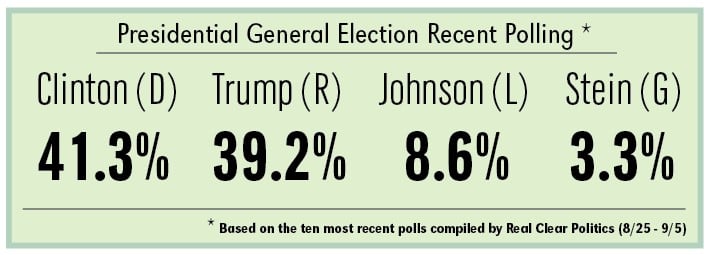The primaries. The conventions. The sound bites.
This past summer was full of political action. Now that the tickets are set for the major parties, what is the current state of the presidential campaign?
According to first-year Chantea Neal, this election season is not quite focused on the issues.
“I feel like it’s more (about) personality,” said Neal.
For much of their lives, Republican presidential candidate Donald Trump and Democratic presidential candidate Hillary Clinton have been high profile figures. On the grandest political stage, however, both are pretty disliked.
During the last week of August, according to Gallup, Trump’s image among national adults was 61 percent unfavorable while Clinton’s image was 57 percent unfavorable.
At Guilford, the reasons behind the low approval ratings differ between the candidates.
“Donald Trump is a racist,” said Neal. “Hillary Clinton thinks she’ll win because of her name.”
For Trump, his antics are a double-edged sword.
His campaign has been dogged by prejudiced comments he has made about Mexican immigrants, Muslims and black people. But his comments grant him constant news and social media exposure.
At the beginning of September, according to Gallup, 80 percent of national adults had read, seen or heard something about Trump in the last two days.
First-year Nina Perez thinks Trump is not presidential material and should stick to the business world. But to her, Clinton is not much better.
“She lies,” said Perez.
Clinton’s negative image stems from her time as secretary of state.
On Sept. 2, the FBI released a summary of its investigation into Clinton’s use of a private email server while being the nation’s top diplomat. Investigators sifted through nearly 45,000 emails that Clinton handed over, some which contained classified information.
The email scandal, along with her association with Democratic Party elites, plagues Clinton with an aura of dishonesty.
“I don’t trust Hillary Clinton,” said first-year James Steiner.
Some students expressed a desire for alternatives.
“I wish Bernie Sanders was on the ballot,” said Neal.
While Sen. Sanders bowed out of the race during the Democratic National Convention, there are other mainstream candidates who want to make a splash in November.
Libertarian Party candidate Gary Johnson, former two-term governor of New Mexico, hopes to sway voters from both parties who are dissatisfied with the major candidates. In the past, Johnson has billed himself as socially liberal, fiscally conservative and anti-interventionist.
Green Party candidate Jill Stein is campaigning as a progressive alternative to Clinton and Trump. Stein’s platform focuses on domestic issues like renewable energy, education and social justice.
Stein and Johnson both face several hurdles between now and Election Day.
One issue is name recognition. Few Guilford students know who they are, a statement which rings true around the nation.
A Gallup poll from July indicated 63 percent of Americans were unfamiliar who Gary Johnson was, while 68 percent were unfamiliar with Stein.
Another problem is ballot and debate access.
Neither party is on the ballot in all 50 states. Likewise, neither candidate is polling above 15 percent in national polls, the threshold to be allowed on the debate stage.
While in Austria this summer teaching German for the American Institute of Musical Studies, Professor of Foreign Languages Dave Limburg caught a sense of what the world thought about the U.S. presidential election.
He noticed the lack of intense election coverage in Europe but did hear what locals thought about Trump.
“They do see a danger in a candidate like Trump, who has become so popular and seems to be combining nationalism and some type of racial politics,” said Limburg. “Whenever there’s that combination and it seems to be popular, the alarm bells go off over there.”
Despite this, Limburg thinks Europeans see Trump’s election chances as slim. He heard someone compare Trump to former Italian Prime Minister Silvio Berlusconi.
According to the Pew Research Center, 85 percent of Europeans have no confidence in Trump’s foreign policy abilities. Clinton, on the other hand, has 59 percent confidence when it comes to world affairs.
With November fast approaching, Guilford and the world will keep tabs on the presidential race.








